Home • Microfinance • Article
Why One Mexican Farmer Got Her Whole Town Hooked On Worms
October 14, 2015
It's festival season in the farming community of San Lorenzo Toxico, Ixtlahuaca, about an hour north of Mexico City. The windows of the church in the center of town brim with colorful flower arrangements. I wander around the plaza outside the main chapel, snapping photographs of the bountiful altars -- stoic crosses, ripe fruits, framed photographs -- that the residents have put together in honor of their patron saint, San Lorenzo.
A teenage girl taps me on the elbow shyly. "No puede sacar fotos aquí," she says. You can't take photos here.
I put away my camera just as Domitila Samano Magdalena bounds through the church gates, beaming, her arms overflowing with more flowers. She hands me the bouquet and wraps the girl in a bear hug, whispering in her ear. The girl nods and blinks at me sheepishly. It's okay, she says, take as many pictures as you want. Domitila said so.
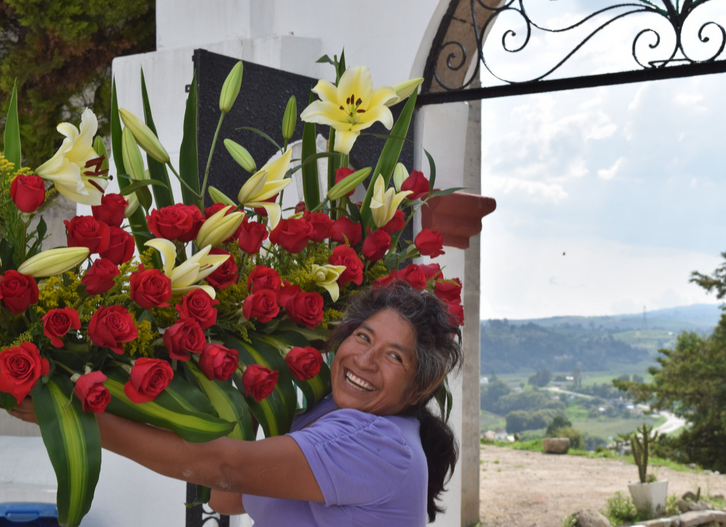
Inside the church, a crowd gathers for prayers. Locals spend hours here reciting rosaries each day during festival week. Domitila greets each congregation member, young and old, with the same gusto she showed the teenager outside, laughing and squeezing their shoulders and addressing them by name. She introduces me as her special friend from America. Their eyes pay me a newfound respect. Even more flower arrangements burst from tables and snake up pillars; Domitila has designed and arranged each one by hand in the small floral studio next to her farm, a few miles down the road.
"You know everyone in town," I tell her. She shrugs and says she likes to teach classes at the library for fun in her spare time. Other things she likes to do in her spare time: run a 12-kilometer loop through the nearby forest, cook elaborate meals from scratch with only homegrown ingredients, and attend local political protests.
Back at her farm, Domitila shows me around. A half-dozen greenhouses overflow with tomatoes, peppers, squash, flowers, nopales. A giant composting operation transforms organic waste into fertile soil she sells at the market. Chickens and turkeys wander up the driveway and down the hill in her backyard, shaded by peach and pear trees. She dug her rainwater harvesting pool with her own hands and then built the piping system that feeds all her produce with the water it collects during the rainy season.
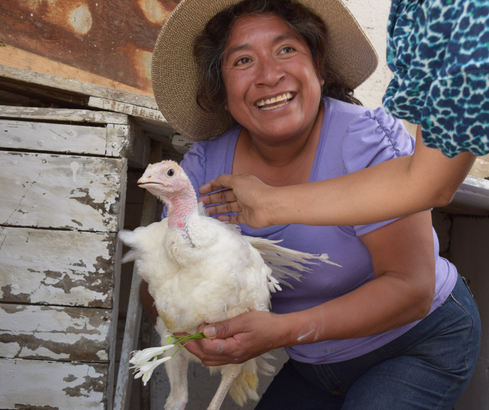
Every plant has its own story, each of which she narrates excitedly. The big white alcatraces, she says, are a favorite of Mexican President Enrique Peña Nieto, who knows her personally. The leaves of the spiky and menacing higuera del diablo make for an excellent curative extract, but eat even one of its seeds and you could die. She planted her tallest tree 26 years ago, when she was pregnant with her son, José Ramón "He's the same age as this tree!" she says in Spanish, patting the trunk proudly and then putting an arm around her son, who helps her maintain and manage the farm.
For more than a decade, Domitila has been partially funding her farm with small loans she receives through VisionFund, a microfinance institution that's partially funded by Kiva, a San Francisco-based crowdfunding platform dedicated to empowering underserved communities around the world. This summer, I served as a Kiva fellow in Mexico, where I met borrowers like Domitila all across the country to see their businesses firsthand. I was so taken with Domitila's infectious spirit and one-woman powerhouse that I went back to visit her multiple times.
Domitila has been fascinated by working with the earth since she was a young girl, growing up in a Mazahua indigenous community nearby. There, she says she spent her childhood learning how to grow her own crops. "It's always been my hobby; I just love plants," she explains. "I've been playing in the dirt since I was a kid."
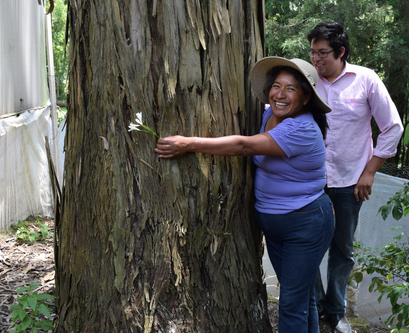
Thirty-two years ago, she inherited a sizable piece of land from her father-in-law in a rural stretch of San Lorenzo Toxico. When she arrived on the property, it was little more than a barren field with a house to live in. She immediately began planting trees.
Once her children three children became teenagers, Domitila began experimenting with a more elaborate flower garden. She ended up growing so many that one day, she decided to take some of the bulbs to the local market to see if she could sell them. She sold out completely -- three bulbs for $10 pesos a pop. ¨I realized that there could actually be money in what I loved to do,¨ she says. ¨I loved it so much that it sparked my curiosity to do more."
In the hopes of expanding her garden into a small farm, Domitila petitioned her local government in the state of Mexico for agricultural trainings. Her first class, on flower cultivation, led her to begin experimenting with growing other plant species. Meanwhile, as her flower business expanded, she began to connect with prominent figures in her community, including Peña Nieto, who was a rising young politician at the time. A photo of the pair hangs over the desk in her home office, along with certifications she's earned in everything from hydroponics to permaculture. These days, she teaches similar classes for free to other VisionFund borrowers and local farmers.
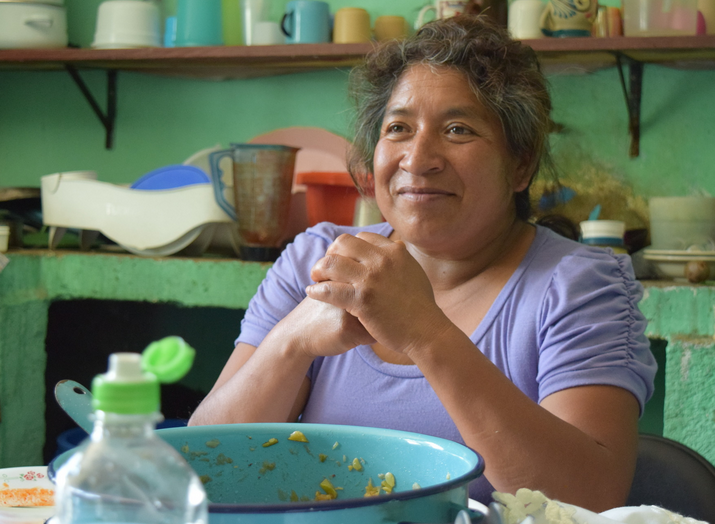
When asked where her favorite place on the farm is, Domitila claps her hands and beckons us into her "casa de lombricultura," the large greenhouse that shelters her composting operation ("lombricultura" translates to "vermiculture," or worm farming). A few years ago, she learned the technique from Dr. Mario Carrera Silva, an expert in the field who travels through Latin America spreading its gospel.
Vermiculture creates a simple, cyclical system: Worms are added to giant bins of soil, where Domitila also disposes all of her household's organic waste. The worms break down the waste, resulting in nutrient-rich soil she sells at the local market. The remaining watery byproduct is also full of healthy compounds, so she's built her piping system to connect to the soil bins. The liquid can then be easily pumped to other areas of the farm.
"It's a perfect circle," Domitila says, digging in a soil bin up to her elbow and producing a handful of pink, squirming earthworms. "There's always more waste being produced that we can reuse and put back into our system. I want the whole world to learn about vermiculture because it's literally turning trash into money."
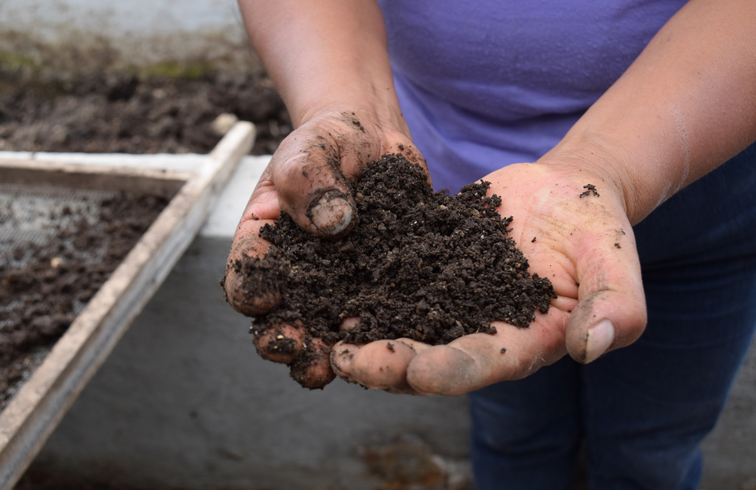
Domitila is well on her way toward achieving that goal -- at least within the borders of San Lorenzo Toxico. Driving us through the community, she points out other vermiculture greenhouses on nearly every farm we pass; she's taught friends, family members, godchildren and almost everyone else in town how to use worms to their advantage.
Her efforts even sparked the attention of the local media. As Domitila tells it, one afternoon, her mother, who lives a few kilometers away, was watching the news when a familiar face filled the screen. There was her daughter, smiling wide as ever and showing reporters her recycling methods. "She was so surprised that she cried," Domitila says. "I didn't tell her in advance because I forgot about it."
Hugging Domitila goodbye at the bus station that evening, I ask her if there's anything she can't do. "Habla Inglés!" she replies, winking. "But I'm fluent in Mazahua."
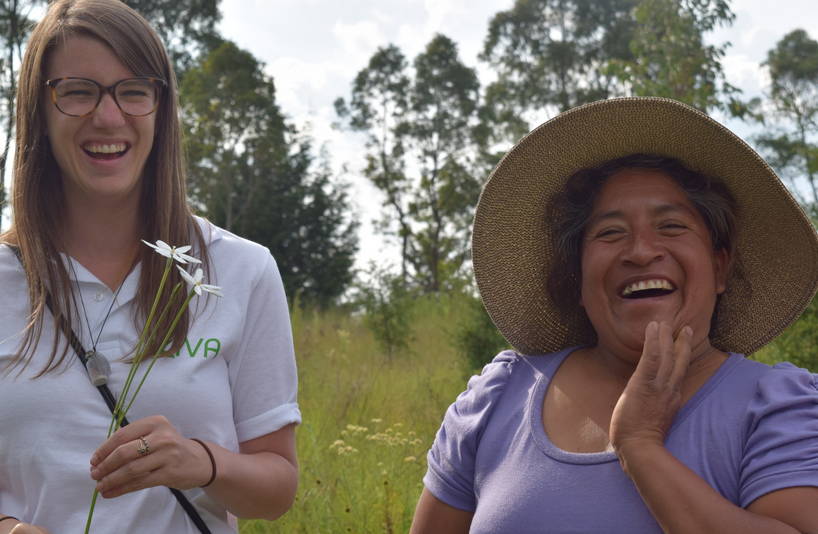
Photos by Marc Dantona and Radhika Warrier. This article was also published on The Huffington Post.
PREVIOUS ARTICLE
Links we like: Childish ideas enlightening our world →NEXT ARTICLE
Posting a Loan with a Kiva Coordinator →













